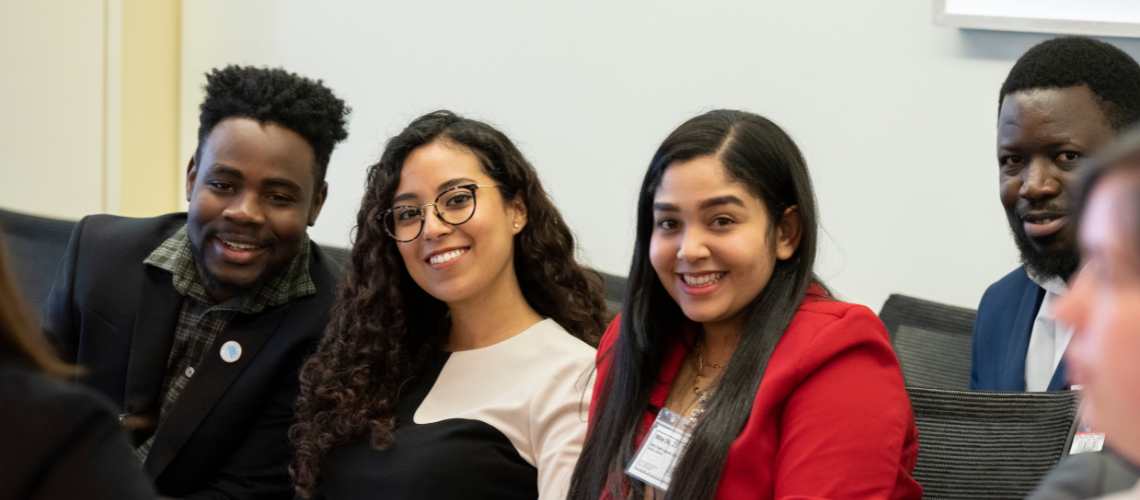 Three young adults smiling at the camera.
Three young adults smiling at the camera.
Our region pulsates with youthful potential yet grapples with a formidable challenge - youth unemployment and unskilled labor. As young leaders who triumphed at the World Bank Group Youth Summit in May 2023, we embark on a mission to unlock sustainable solutions that promote inclusive development and growth.
Our winning proposal aimed to address the complex web of youth unemployment and informal employment across Latin America and the Caribbean through a prism of education, empowerment, and collaboration.
The 2022 Labour Overview for Latin America and the Caribbean revealed a troubling reality. With an average youth unemployment rate of 16 percent, the Latin America and Caribbean region grapples with the insidious specter of wasted potential . This challenge is compounded by the harsh reality of informal employment, where around 60 percent of young individuals find themselves ensnared. Such staggering statistics underscore the structural barriers entrenched within the region's labor markets.
In our quest, we identified five pressing challenges in the region's landscape and propose the following :
- Limited access to formal education: Accessibility to quality education remains a cornerstone issue, hindering the emergence of a skilled workforce.
We propose expanding access to education and training. Investing in infrastructure, scholarships, and lifelong learning initiatives ensures that education becomes a transformative tool, lifting barriers to social and economic mobility.
- Gender gap in youth employment: Gender disparity in education and in employment perpetuates inequality, throttling progress.
We propose promoting gender equality in employment. Initiatives such as High School Mentorship Programs and Networking Platforms address gender disparity at the root, enabling young women to navigate education and career paths with confidence.
- Lack of institutional coordination and skill-based hiring: The absence of cohesive strategies and institutional collaboration hinders the translation of skills into employment opportunities.
We propose strengthening institutional coordination and partnerships. Collaborative partnerships between government, nonprofits, and the private sector create a resilient ecosystem that fosters innovation, amplifies resources, and propels sustainable solutions.
- Lack of skills and technical proficiency: A yawning gap exists between skill demand and supply, leading to youth potential underutilization.
We propose strengthening youth skill development. By aligning education with industry needs, fostering vocational training, and introducing apprenticeships, we empower the youth with practical skills and real-world experience, aligning them with market demands.
- Informal labor market and skill recognition: Informal employment emerges as a significant hurdle, exacerbating youth vulnerability to economic shocks.
We propose enhancing skill recognition and certification. Standardizing skill recognition through innovative methods empowers informal workers with formal certifications, unlocking doors to sustainable employment and financial stability.
Within the tapestry of empowerment, we acknowledge the hurdles that are formidable gatekeepers to sustainable development. As young leaders from the Latin America and Caribbean region, we understand that implementing our visionary plan to address youth unemployment and unskilled labor is challenging.
Our proposals are a testament to our commitment. As we embark on this transformative voyage, data-driven impact assessment, powered by indicators such as the Gini Coefficient and Gender Inequality Index, will guide our progress. We embrace a comprehensive approach that not only quantifies change but fosters an ecosystem of growth and empowerment.
Navigating challenges and forging new frontiers
In a landscape where access to resources is uneven and institutional barriers persist, the road ahead may prove arduous. However, we urge international organizations like the World Bank to collaborate in unique ways. By fostering cross-sector partnerships prioritizing localized solutions, leveraging innovative funding mechanisms, and championing policies that bolster youth inclusion, we can surmount these challenges and illuminate a path toward a prosperous and equitable future for our region. Through these nuanced approaches, we can transcend obstacles and embark on a journey of unprecedented impact.
Our roadmap to address youth unemployment and unskilled labor in Latin America and the Caribbean embodies our shared aspirations. It underscores the vital role of education, inclusivity, and collaboration in shaping a sustainable future . As we stand on the cusp of change, let us propel this momentum forward, a symphony of voices harmonizing to pave the way for a brighter, more equitable tomorrow.
Stay updated with our weekly article
Related articles:





Join the Conversation